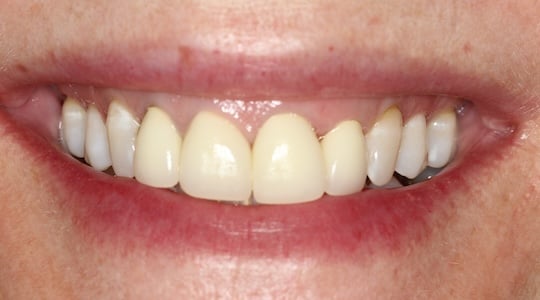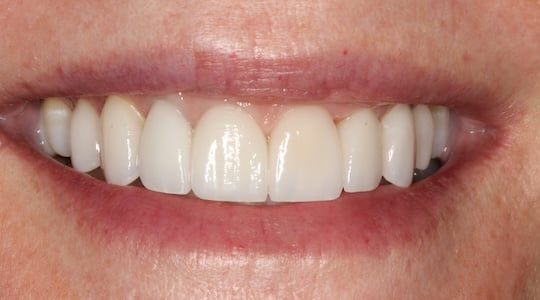At Lake Forest Smiles, we understand that your smile isn’t just about looks. It’s also about living life without pain, chewing your favorite foods, and speaking with confidence. Full mouth rehabilitation is a comprehensive, customized treatment approach that rebuilds and restores all teeth in both the upper and lower jaws. It’s not just a cosmetic transformation. It’s a medical and functional restoration designed to reclaim your oral health, bite function, and overall quality of life.
What is Full Mouth Rehabilitation?
Full mouth rehabilitation can also be known as full mouth reconstruction or restoration. It is a tailored treatment plan that combines restorative, neuromuscular, and sometimes surgical dentistry to correct complex dental issues. This comprehensive process addresses:
- Severely worn teeth from grinding
- Multiple missing teeth
- Broken, chipped, or cracked teeth
- Advanced decay
- Bite misalignment
- Jaw pain or temporomandibular joint (TMJ) disorders
- Oral trauma from accidents or injuries
- Long-standing neglect of oral health
Unlike a smile makeover, which is elective and primarily aesthetic, full mouth rehabilitation is a medical necessity for many patients whose oral health is compromised. While it often results in a more attractive smile, its main goal is restoring function and eliminating pain.
Who Needs Full Mouth Rehabilitation?
You may be a candidate for full mouth rehabilitation if you experience any of these symptoms or problems:
- Chronic jaw pain, tension headaches or migraines linked to bite issues
- Difficulty chewing due to worn, missing, or unstable teeth
- Speech problems caused by tooth loss or misalignment
- Teeth that are severely damaged from decay, trauma, or grinding
- A collapsed bite
- A combination of dental problems that cannot be fixed with simple treatments
It’s common for these issues to build gradually. Patients who haven’t seen a dentist in many years or who have undergone piecemeal dental work over time may discover that their oral health has declined significantly. That’s where full-mouth rehabilitation can help! By creating a strategic, long-term solution instead of short-term fixes, we are able to restore your mouth to full health and function.
What Treatments are Included in Full Mouth Rehabilitation?
Every rehabilitation plan is different, tailored specifically to your unique dental condition, health history, and goals. Depending on your needs, your treatment plan may involve a combination of any of these treatments.
Dental Crowns and Bridges
Crowns restore individual teeth that are broken or heavily decayed, while bridges can replace one or more missing teeth by anchoring to adjacent healthy teeth.
Implant Restoration
We provide implant-supported restorations such as crowns, bridges, or implant-retained dentures. These provide a stable, permanent solution for missing teeth and preserve bone health.
Tooth-Colored Fillings and Inlays/Onlays
These restorations repair damaged or decayed teeth while maintaining a natural look and function.
Periodontal Therapy
Healthy gums are essential for rehabilitation. We address gum disease, provide deep cleanings, and may coordinate surgical periodontal care if needed.
Root Canal Therapy
For teeth with infected or compromised internal structures, root canal treatment saves the tooth and alleviates pain.
Orthodontic Treatment
Braces or clear aligners may be necessary to correct bite issues or align teeth properly before restorative work is completed.
TMJ Treatment
If your bite problems are linked to jaw joint dysfunction, we may integrate custom oral appliances, splint therapy, or refer you to advanced TMJ care.
Prosthetics: Full or Partial Dentures
If multiple teeth are missing, we offer well-fitted, functional dentures that allow you to eat and speak with confidence again.

Benefits of Full Mouth Rehabilitation
There are many benefits that patients can experience from a full mouth rehabilitation treatment. Here are a few:
- Prevent Future Dental Issues: A comprehensive solution minimizes the need for constant dental repair.
- Restored Ability to Eat and Speak Comfortably: Enjoy your meals and conversations again without worrying about pain or embarrassment.
- Improved Oral Health: Remove infection, decay, and instability to promote long-term dental and overall health.
- Stronger, More Durable Teeth: Rebuild worn or damaged teeth with long-lasting restorations.
- Proper Bite Alignment: Eliminate TMJ stress, uneven wear, and bite-related pain.
- Improved Confidence and Quality of Life: Regain the ability to smile, laugh, and engage in life fully.
The Process: What to Expect
Full mouth rehabilitation is an extensive, multi-phase journey. We guide you through each step with compassion and care. Here’s what the typical process looks like:
- Comprehensive Consultation: We start with a detailed discussion about your concerns, medical history, and goals. We’ll perform a thorough examination, including digital X-rays, 3D imaging, intraoral photos, and impressions.
- Diagnostic Phase: This stage includes bite analysis, periodontal charting, and possibly creating a mock-up of your new smile. This allows us to plan your treatment precisely and preview your results.
- Treatment Planning: Once we understand your oral condition, we’ll develop a customized plan that addresses your needs, priorities, and budget. We’ll walk you through each step, expected timelines, and available sedation options if needed.
- Active Treatment: This phase is when we carry out the agreed-upon procedures, often over several visits. It could involve restorations, extractions, gum therapy, root canals, or implant restorations.
- Final Restoration and Adjustment: Once healing and foundational work are complete, we place your final restorations, such as crowns, bridges, or prosthetics. We will fine-tune your bite for optimal function.
- Maintenance and Follow-Up: Rehabilitation isn’t the end—it’s a new beginning. We’ll help you maintain your results with regular checkups, cleanings, and any necessary follow-up care.
During your first visit, we’ll explain everything in simple terms and give you time to ask questions, think things over, and decide what feels right. No pressure, no rush, just expert guidance and compassionate care.
The Length of Your Treatment
The length of the treatment depends on the complexity of your case and whether we’re addressing multiple issues like missing teeth, gum disease, or bite problems. Some cases can be completed in a few months, while more advanced treatments may take 12-18 months with healing periods in between. We’ll create a timeline that works with your needs and lifestyle.
Thanks to sedation dentistry, we may be able to combine treatments. Sedation dentistry can make it so you can be relaxed or even fully under while we complete treatments together, such as placing crowns on some teeth and placing implants in other areas.
What is Recovery Like?
Recovering from full mouth rehabilitation varies depending on the procedures involved. While some treatments like crowns or fillings have minimal downtime, implant placement or extensive gum therapy may require a few days of healing.

General Recovery Timeline:
- Days 1-3: Some swelling or soreness may occur, especially after oral surgery or multiple procedures in one visit. Pain is typically well-managed with prescribed or over-the-counter medication.
- Weeks 1-4: You’ll adjust to temporary restorations or healing appliances. Eating soft foods and avoiding excessive pressure on healing areas is important.
- Weeks 4-12+: Permanent restorations are placed, and your bite is adjusted for balance and comfort. Your mouth continues to adapt to your new teeth and alignment.
We provide complete post-treatment instructions, monitor your healing, and schedule follow-ups to ensure everything feels and functions just right. You’ll never be left guessing, and our team is here to support you every step of the way.
Post-Care Instruction: Protecting Your Investment
After completing full mouth rehabilitation, it’s important to care for your new restorations just like you would your natural teeth. Proper post-care ensures the longevity of your dental work and helps you maintain the health, comfort, and function of your new smile for years to come.
Just because your new teeth are strong and functional doesn’t mean they’re invincible. Daily oral hygiene is crucial:
- Avoid abrasive toothpaste or hard scrubbing, which can damage the surface of certain restorations.
- Brush twice daily with a soft-bristled toothbrush and fluoride toothpaste. Use gentle, circular motions to clean around crowns, bridges, and other restorations without irritating the gums.
- Floss daily to remove plaque and debris between teeth and under bridges or implant restorations. If traditional floss is difficult to use, try floss threaders or a water flosser.
- Rinse with an antibacterial mouthwash to help reduce bacteria and support gum health.
Your new teeth allow you to eat more comfortably, but some precautions still apply, especially in the weeks following treatment.
- Avoid hard, crunchy, or sticky foods (like nuts, ice, caramel, or hard candies) for the first few weeks. These can put undue pressure on new restorations or disrupt healing sites.
- Limit staining beverages like red wine, coffee, and tea if your restorations are made of materials that may discolor over time.
- Cut food into smaller pieces to reduce chewing force, especially on freshly placed restorations or healing areas.
- Stay hydrated to prevent food particles from sticking and promote oral tissue health.
If you have a history of teeth grinding or clenching, wearing a custom night guard is essential. Even with restored teeth, grinding can cause:
- Chipped or fractured restorations
- Jaw pain or TMJ inflammation
- Uneven wear and tear
A custom-fit guard made in our office protects your investment while allowing your jaw muscles to relax during sleep.
Routine check-ups are more important than ever. You’ve done the hard work, now it’s time to maintain the results. We recommend:
- Exams and cleanings every 3-6 months, depending on your gum health and medical history.
- Digital imaging as needed to monitor bone density levels, implant stability, and the condition of your restorations.
- Bite evaluations to ensure your teeth are functioning harmoniously. If needed, small adjustments can be made to avoid long-term damage.
- Professional polishing of restorations to keep them smooth, stain-free, and beautiful.
We’ll monitor your restorations over time, identify any signs of wear early, and provide preventive care to help you avoid future complications.
To maximize the life of your restorations, try to avoid the following habits:
- Chewing on pens, ice, or fingernails
- Using teeth as tools (to open packages or bite into hard objects)
- Smoking or tobacco use, which increases the risk of gum disease and implant failure
- Skipping dental visits, even if everything feels fine
Contact us right away if you experience:
- Persistent discomfort, swelling, or sensitivity
- A loose crown, bridge, or denture
- Clicking or pain in your jaw joint
- Bleeding or signs of infection
- Difficulty chewing or speaking
Early attention to small issues can prevent bigger problems and keep your smile on the right track!
Frequently Asked Questions
Full mouth rehabilitation can be a scary or new treatment to most patients. Here are some frequently asked questions that might calm your nerves:
We make your experience as comfortable as possible, using local anesthesia, sedation options, and a gentle approach. Most patients report less discomfort than expected.
Many procedures in full mouth rehabilitation are medically necessary and may be partially covered. We’ll work with your insurance and offer financing options.
With sedation dentistry, sometimes we are able to do it in one sitting. But many patients prefer a phased approach for comfort, healing, and budgeting.
If you have widespread damage, multiple missing teeth, bite issues, or jaw pain, a more comprehensive approach is likely. During your consultation, we’ll evaluate your entire mouth and help you determine whether a full rehabilitation or a more limited treatment is the right plan for you.
Yes! Many patients choose to phase their treatment over time for comfort or budgeting reasons. We’ll help you prioritize which procedures should be done first and create a step-by-step plan that works for your schedule and lifestyle.
Not necessarily. While dentures may be part of your treatment, if you have extensive tooth loss, full mouth rehabilitation can also include crowns, bridges, implants or a combination of solutions. The goal is to restore full function and not just replace teeth.
Absolutely. While the focus of full mouth rehabilitation is function, we also design restorations that look completely natural. You’ll have a healthy, confident smile that feels and looks like your own.
Yes, if your TMJ disorder is caused by bite misalignment or worn teeth, rehabilitation can restore balance and relieve pressure on the jaw joints, often reducing or eliminating pain.
Yes! We offer a range of sedation options from mild oral sedation to deeper conscious sedation, so you can receive treatment in a calm and stress-free environment. Your comfort is our priority.
It’s never too late to reclaim your oral health. We welcome patients who haven’t had regular dental care and are ready to take the first step. We offer judgment-free, supportive care to help you move forward confidently.
Absolutely! Whether you’re 40, 60, or 80, it’s never too late to restore your oral health and regain confidence. In fact, many older patients benefit most if they have experienced decades of wear, tooth loss, or ill-fitting dentures. We personalize treatment for your age, health, and goals.
Invest in Your Health- Book a Consultation Today!
You don’t have to live with chronic dental pain, missing teeth, or an unstable bite. Full mouth rehabilitation is a path toward lasting health, restored confidence, and a better quality of life. Let’s rebuild your smile together. Give us a call today!


